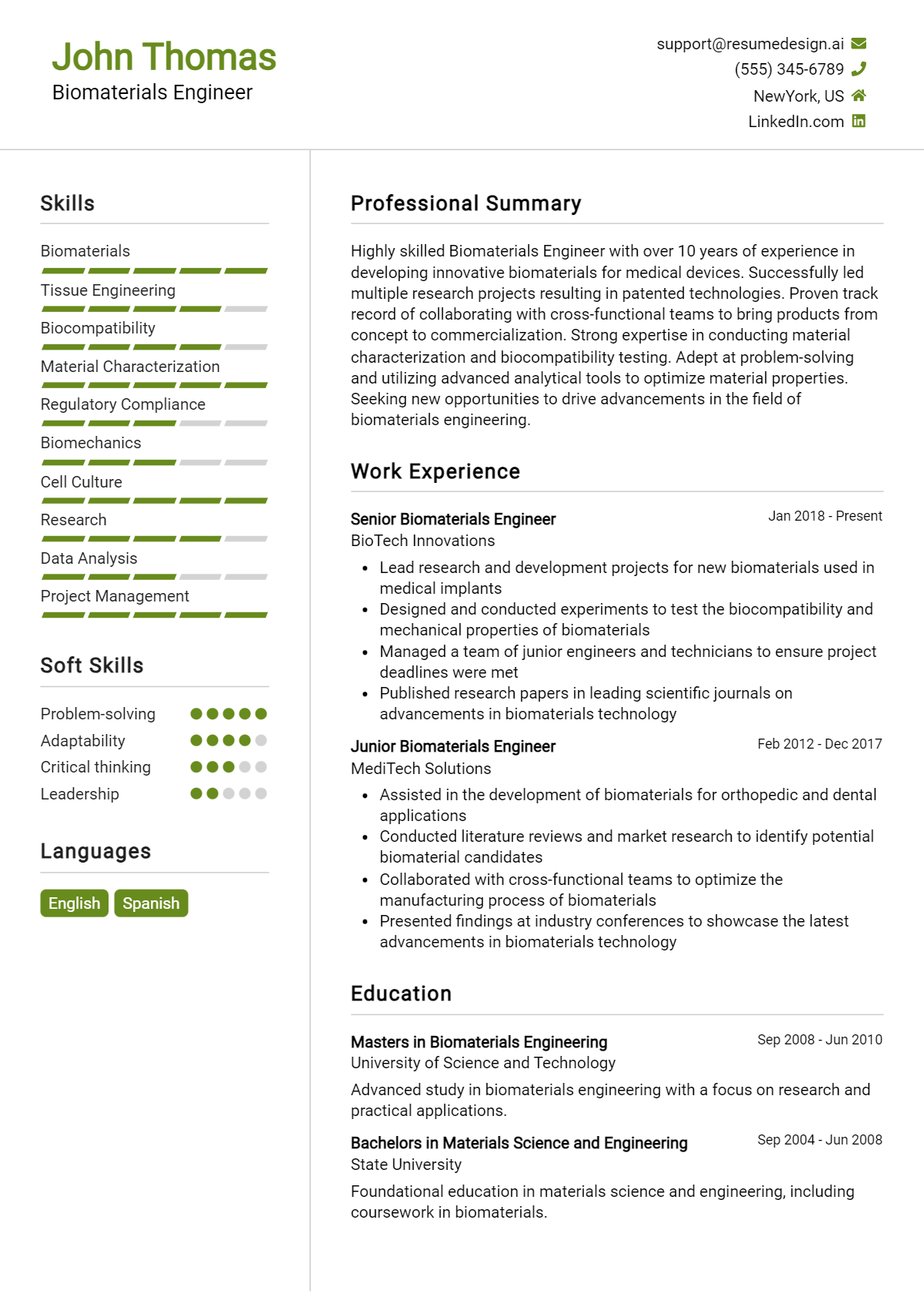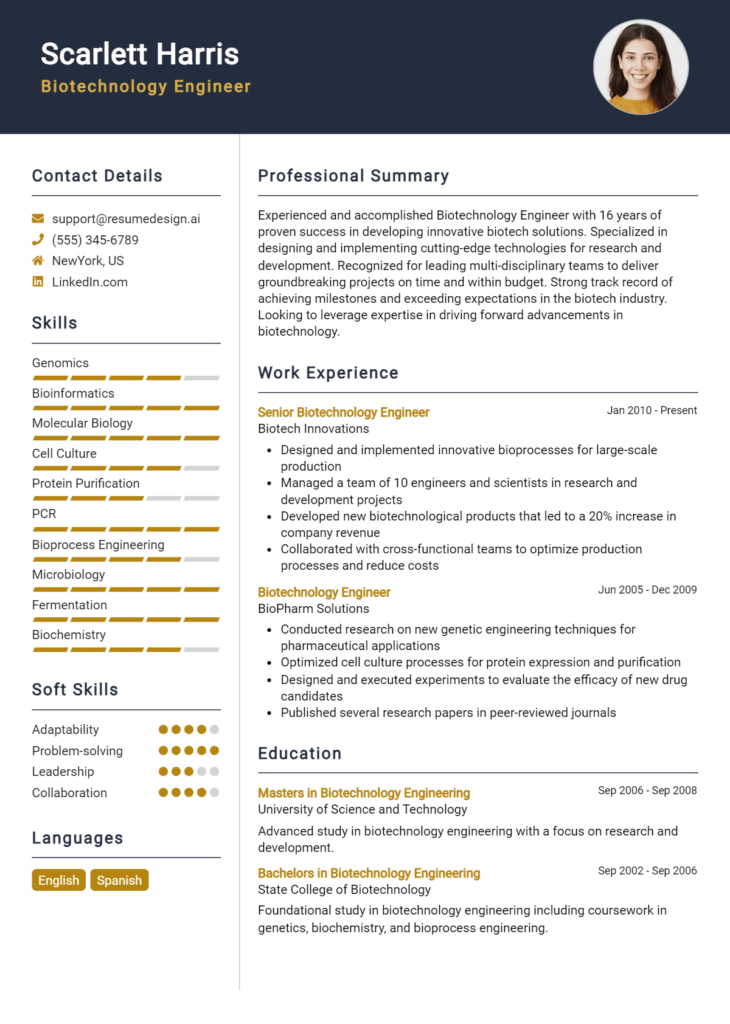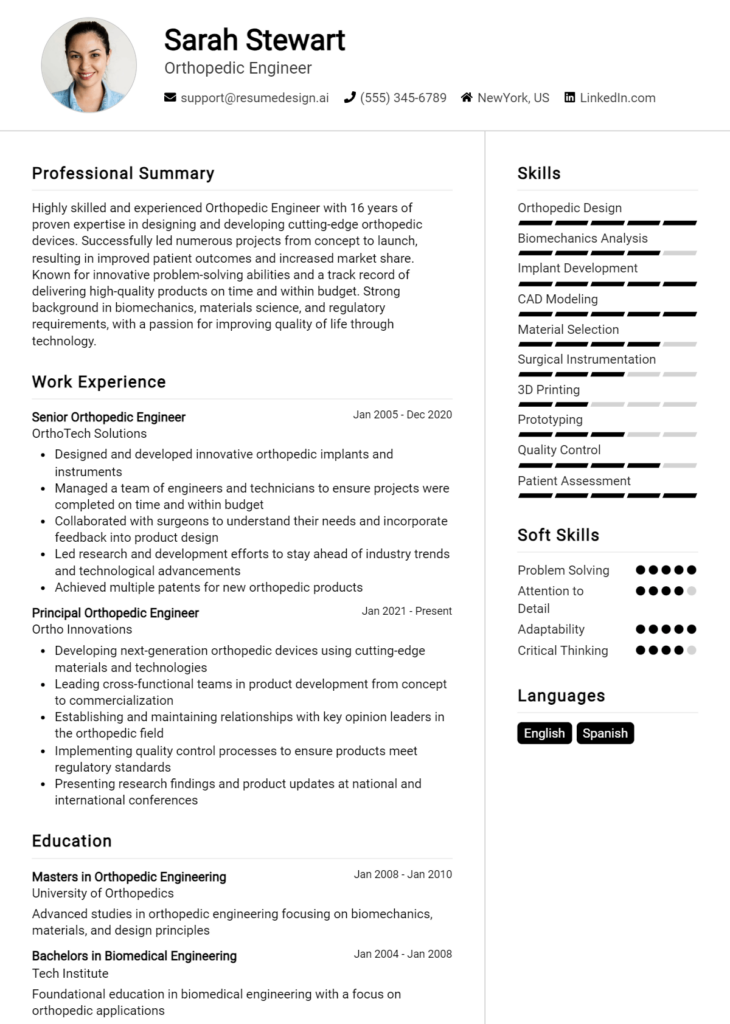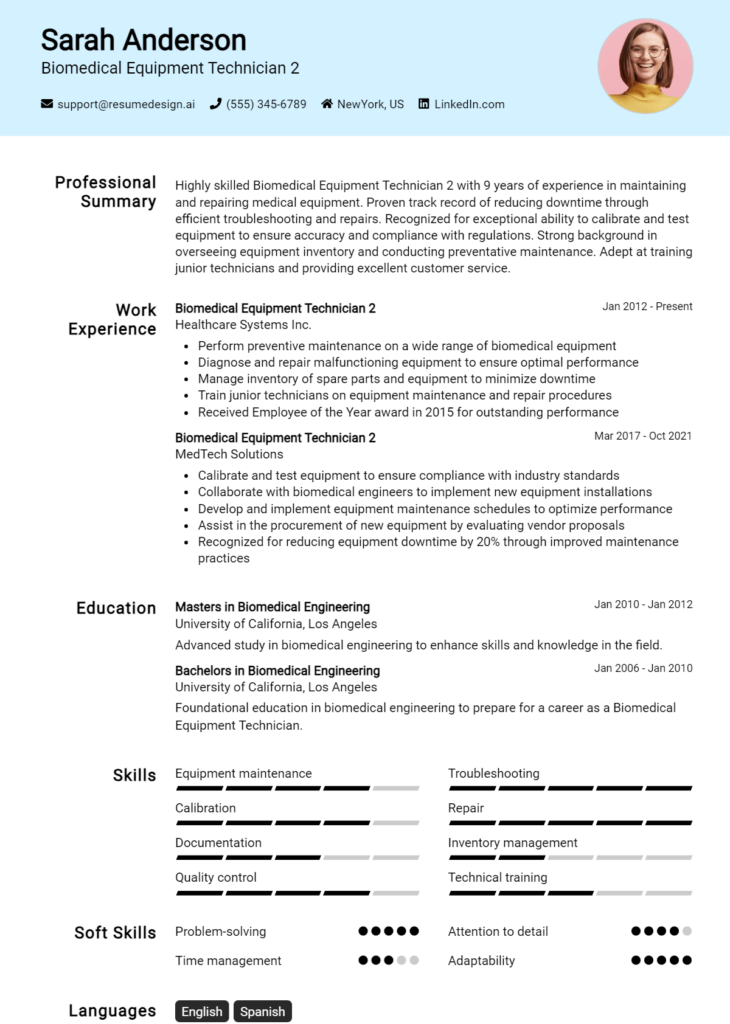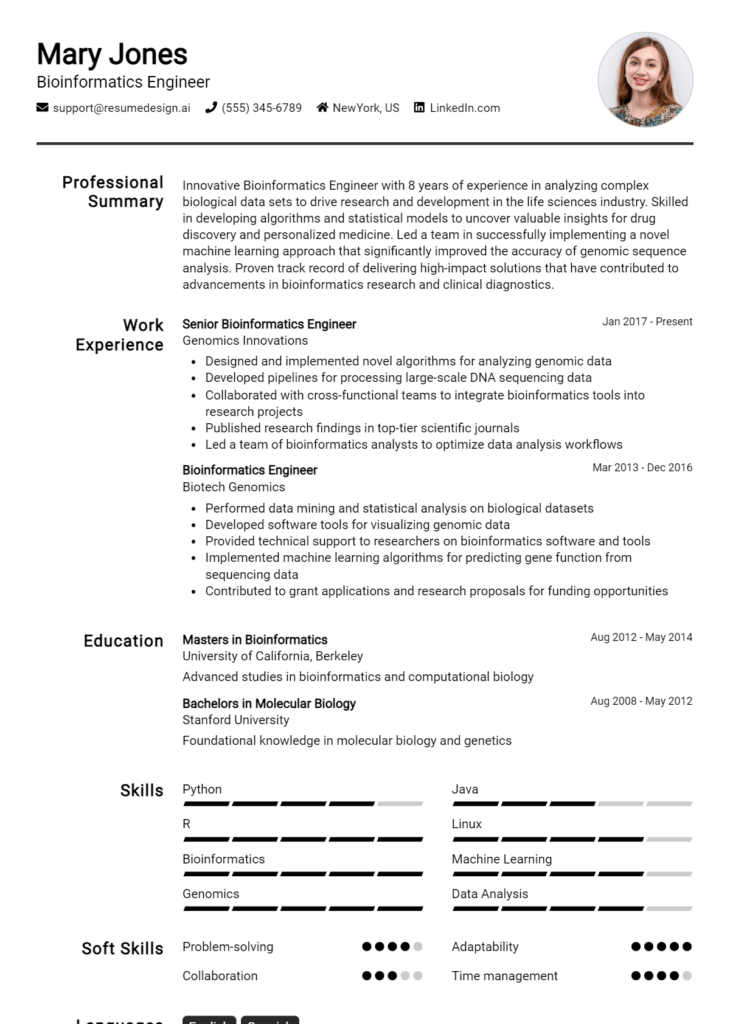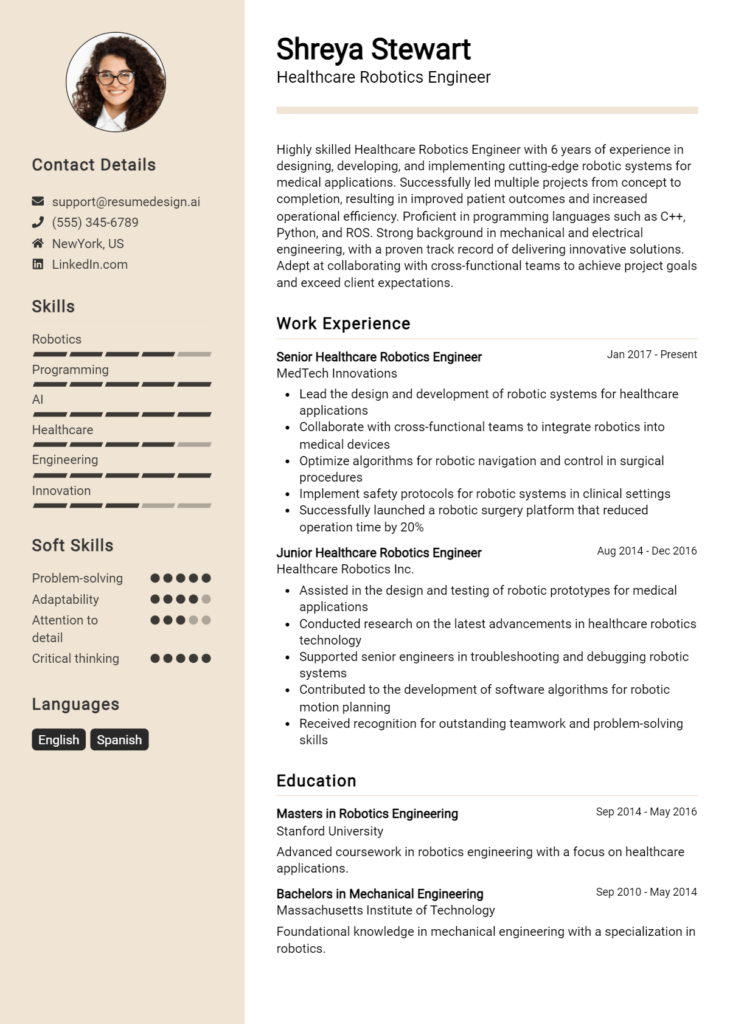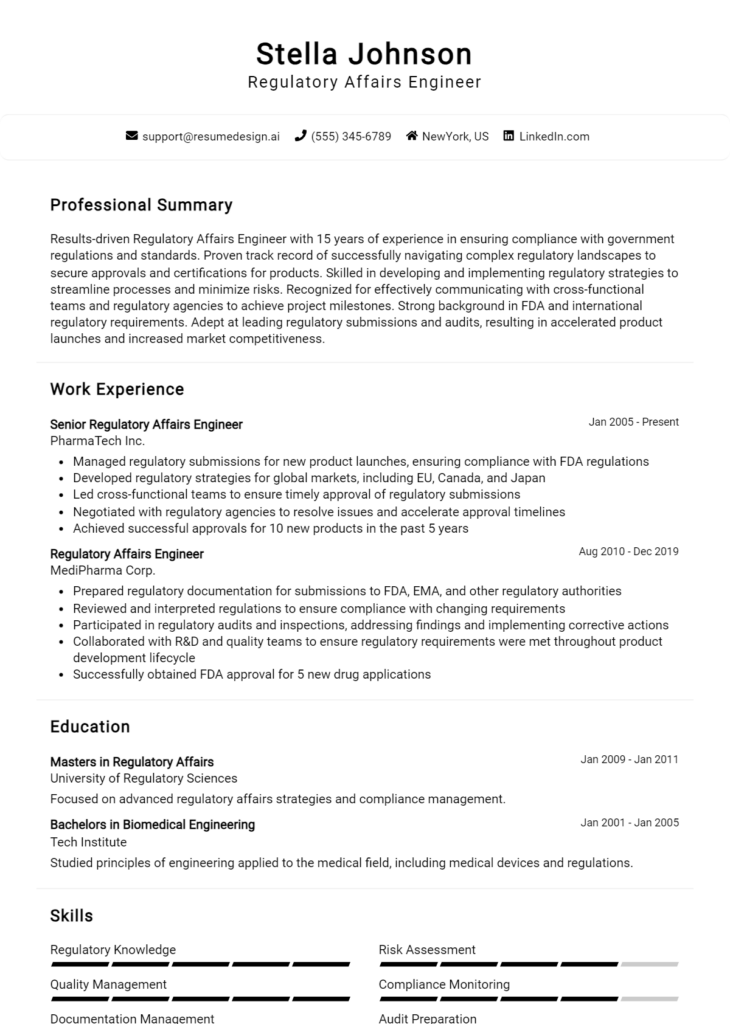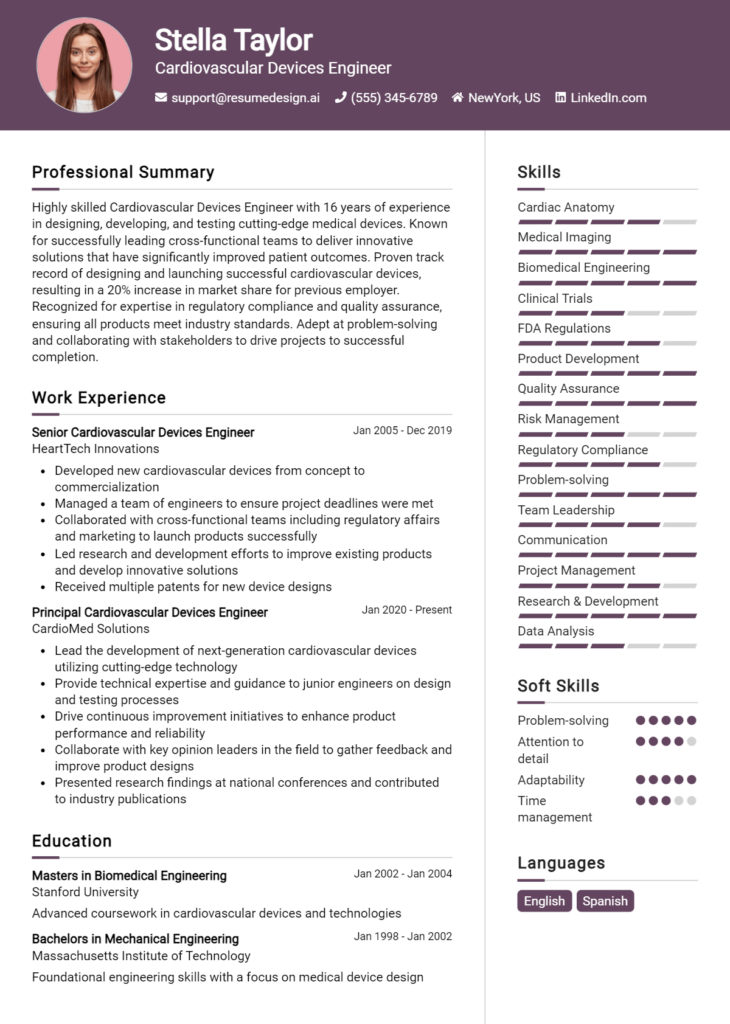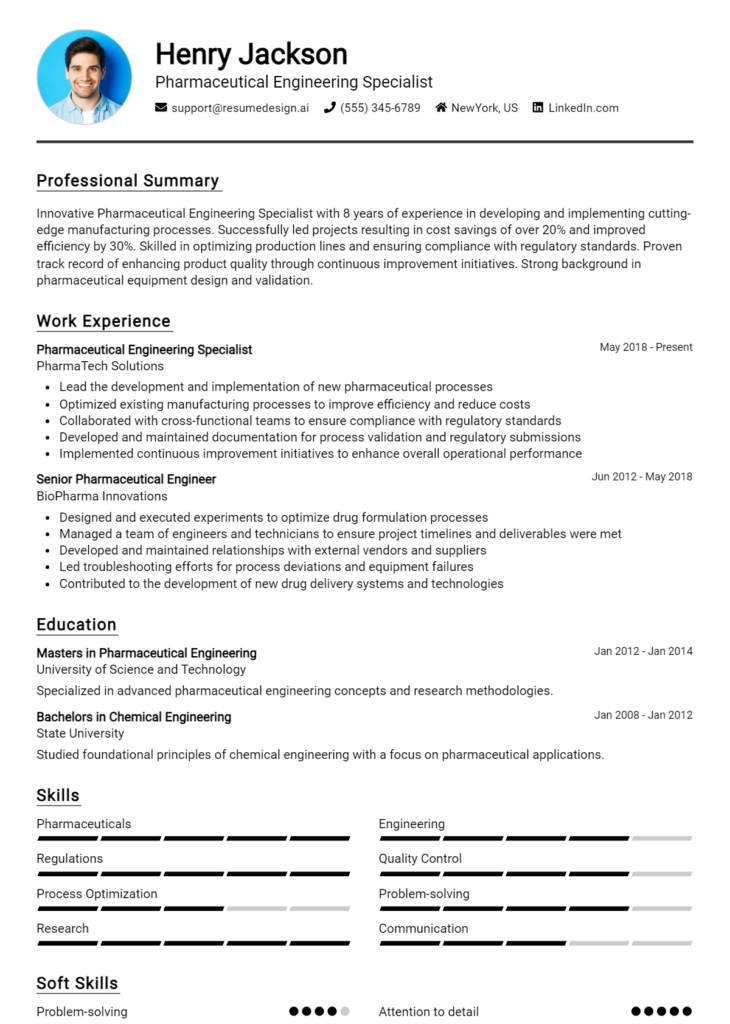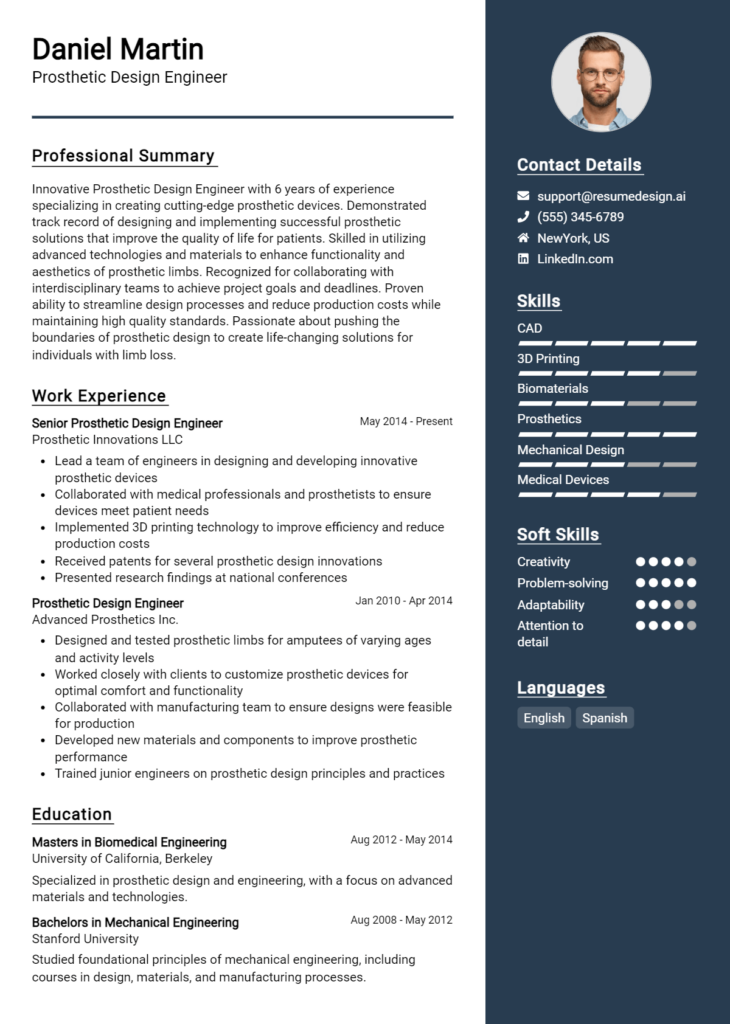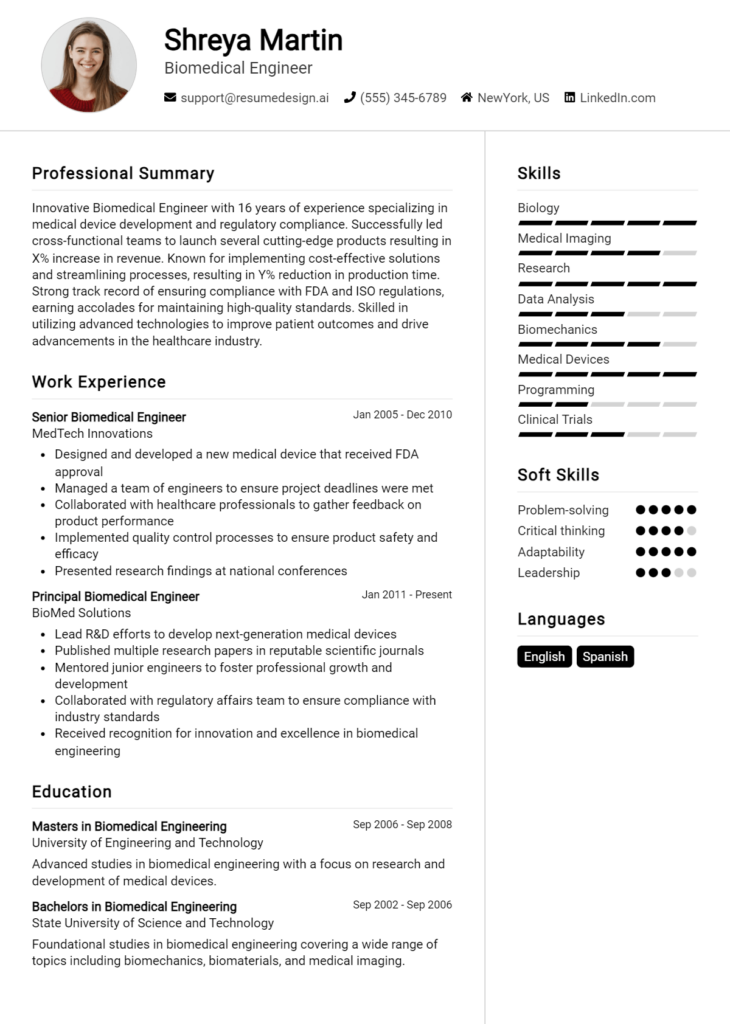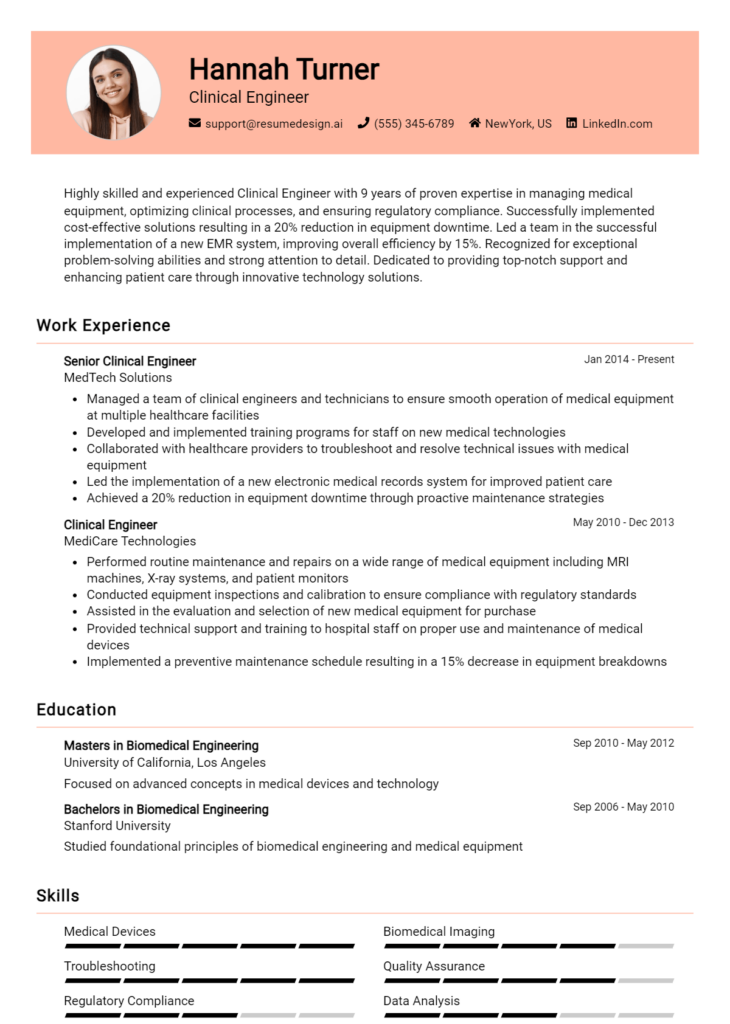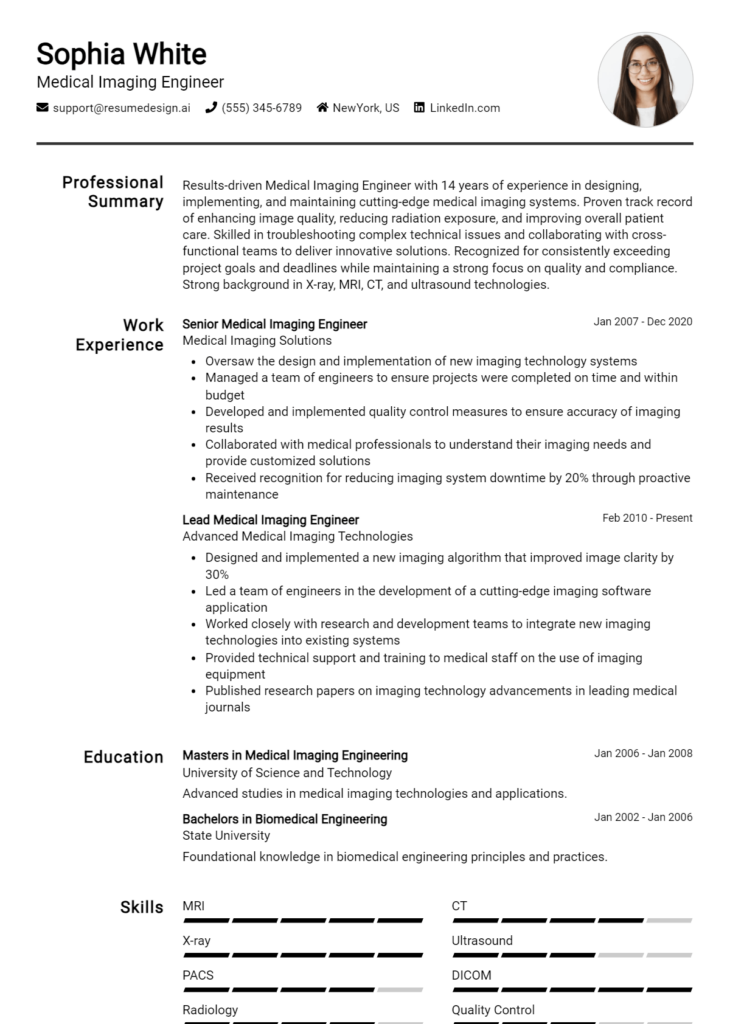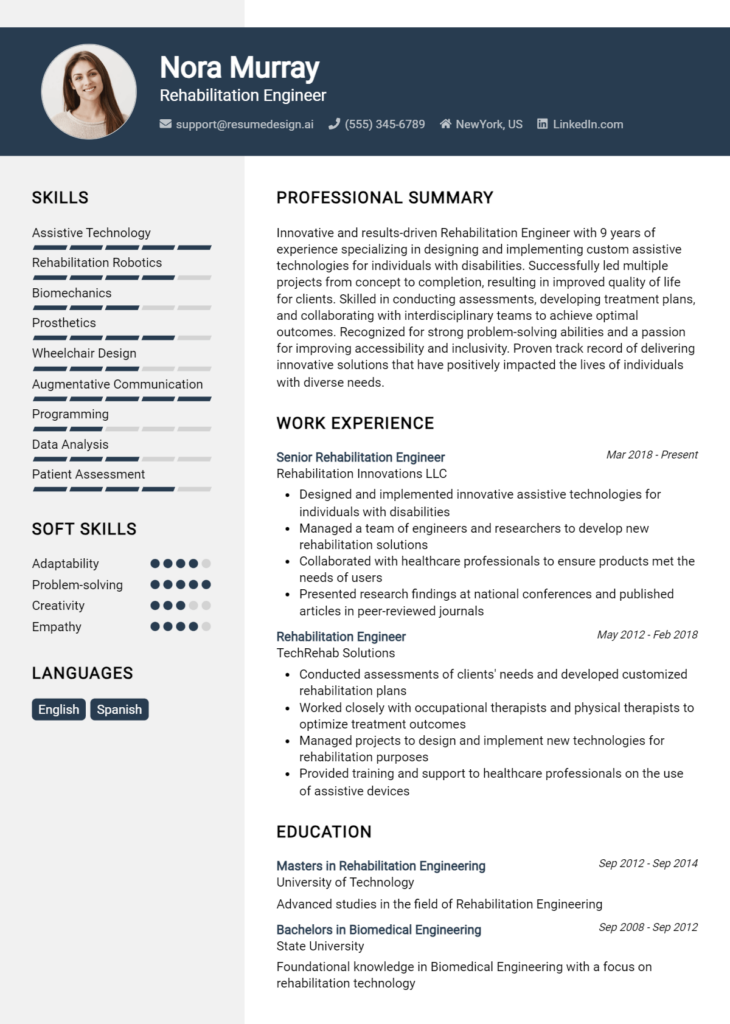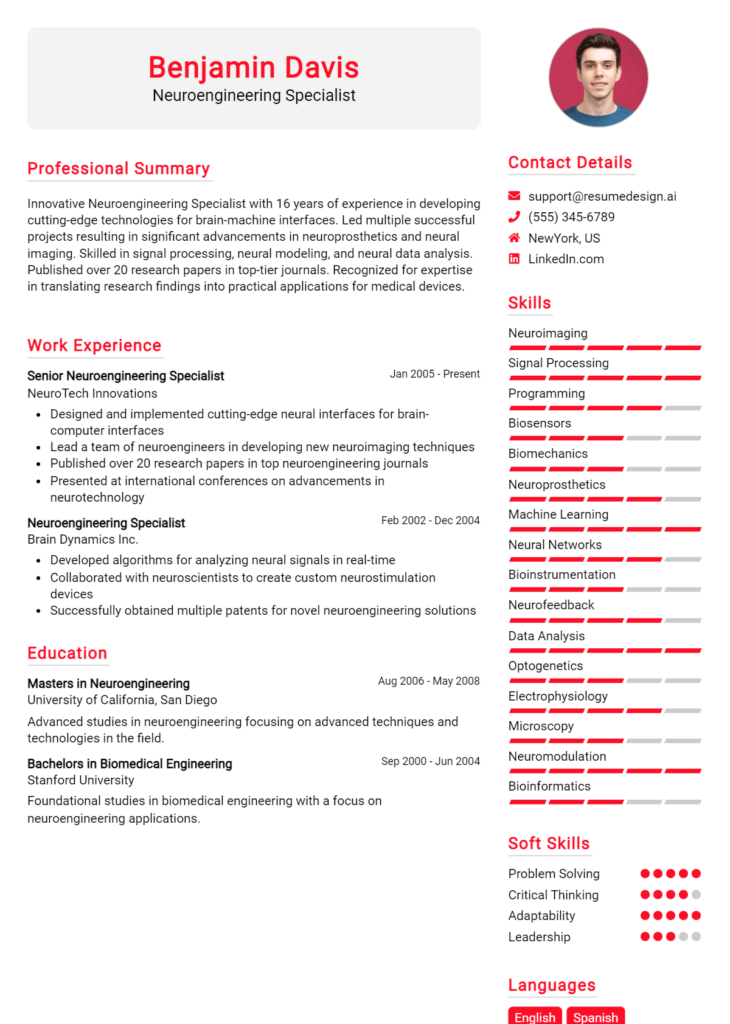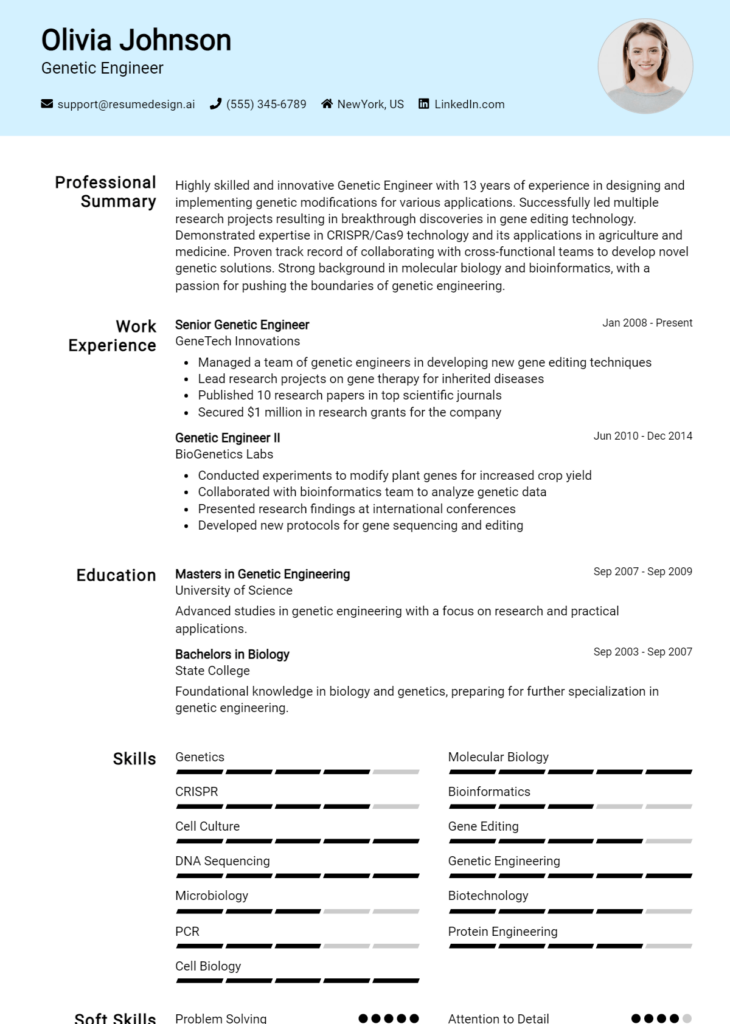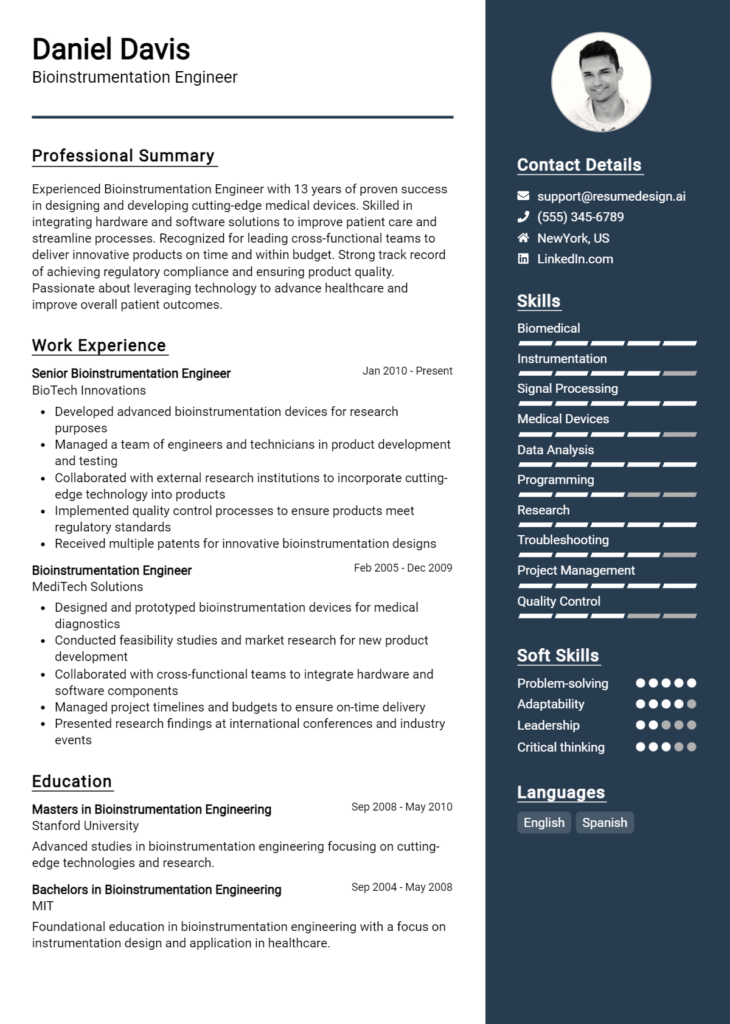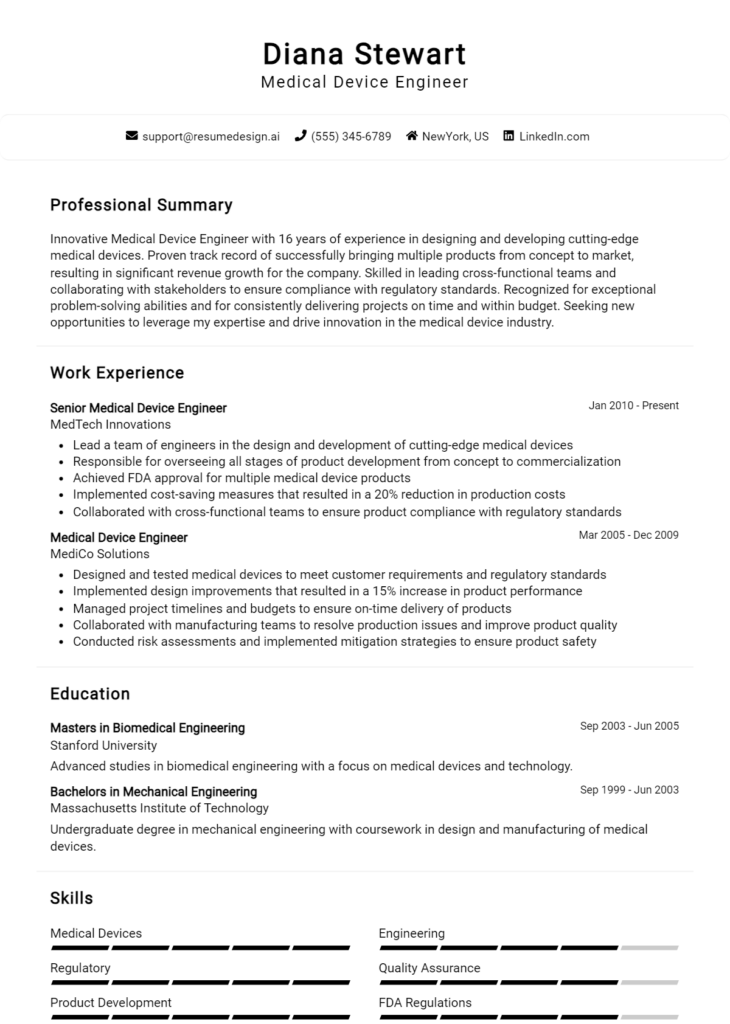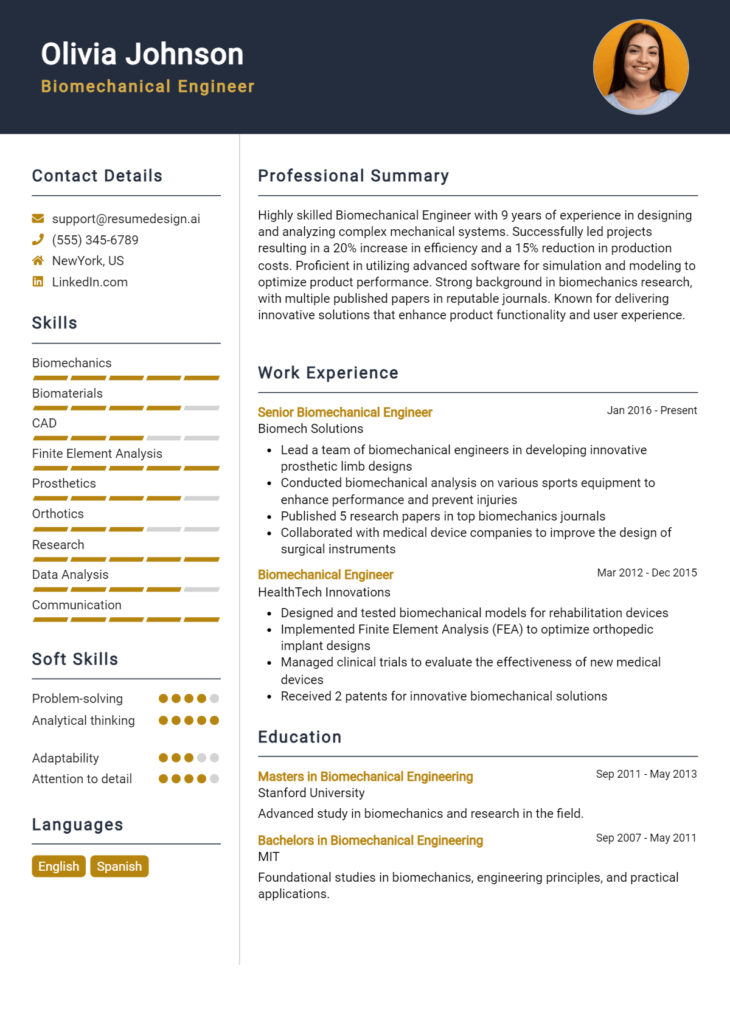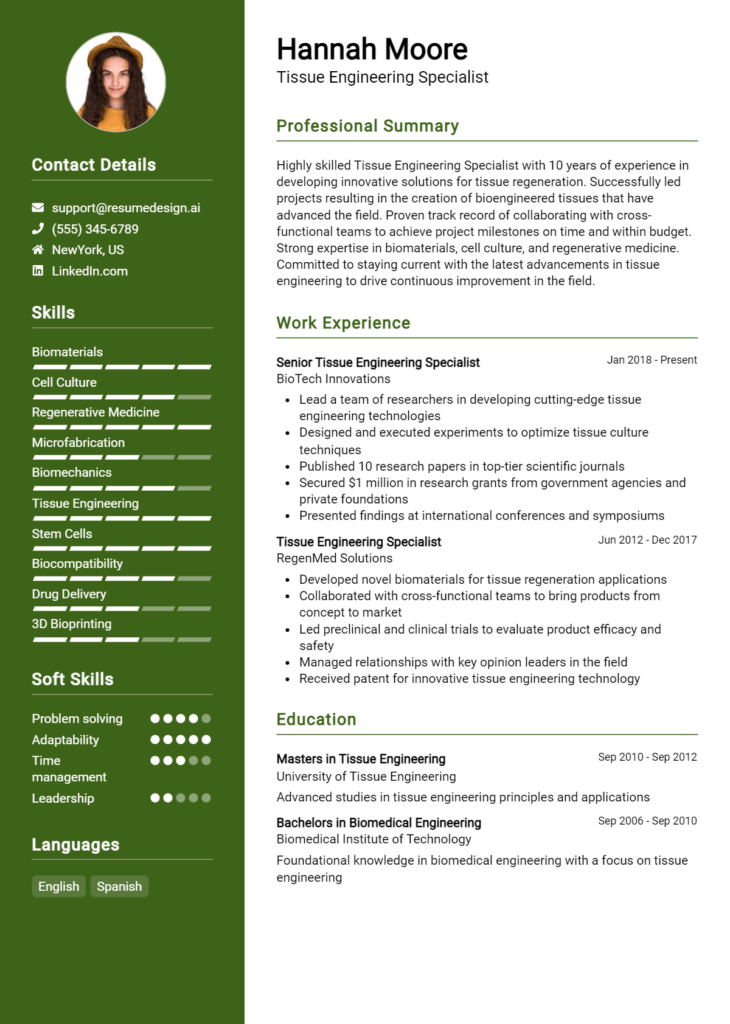Biomaterials Engineer Core Responsibilities
A Biomaterials Engineer plays a pivotal role in the development and application of materials for medical and biological uses. Key responsibilities include designing new biomaterials, conducting research and testing for biocompatibility, and collaborating with medical professionals and product developers. Essential skills encompass technical expertise in materials science, operational efficiency, and problem-solving abilities. These competencies are crucial for meeting organizational goals and advancing innovative solutions. A well-structured resume highlights these qualifications effectively, showcasing a candidate's potential impact.
Common Responsibilities Listed on Biomaterials Engineer Resume
- Design and develop new biomaterials for medical applications.
- Conduct research on biocompatibility and material performance.
- Collaborate with cross-functional teams, including R&D, manufacturing, and clinical affairs.
- Perform testing and analysis to ensure compliance with industry standards.
- Develop and optimize manufacturing processes for biomaterials.
- Provide technical support and expertise to clients and stakeholders.
- Document research findings and prepare technical reports.
- Stay updated on advancements in biomaterials and related technologies.
- Participate in regulatory submissions and quality assurance processes.
- Implement innovative solutions to solve engineering challenges.
- Mentor junior engineers and contribute to team development.
High-Level Resume Tips for Biomaterials Engineer Professionals
In the competitive field of biomaterials engineering, a well-crafted resume is crucial for making a strong first impression on potential employers. Your resume serves as a powerful marketing tool that showcases not only your technical skills but also your professional achievements in the industry. Given the specialized nature of biomaterials engineering, it is essential that your resume effectively reflects your qualifications, experiences, and contributions to relevant projects. This guide will provide practical and actionable resume tips specifically tailored for biomaterials engineer professionals, helping you to stand out in a crowded job market.
Top Resume Tips for Biomaterials Engineer Professionals
- Tailor your resume for each job application, aligning your skills and experiences with the specific job description.
- Highlight relevant experience in biomaterials research and development, focusing on specific projects you've worked on.
- Quantify your achievements by including metrics or outcomes that demonstrate the impact of your work.
- Showcase industry-specific skills such as materials characterization, biocompatibility testing, and regulatory compliance.
- Include any certifications, such as those related to biomaterials or quality assurance, that enhance your qualifications.
- Utilize keywords from the job description to improve your chances of passing through Applicant Tracking Systems (ATS).
- Incorporate a summary statement at the top of your resume that concisely outlines your expertise and career goals.
- Keep the layout clean and professional, using bullet points for readability and ensuring consistent formatting throughout.
- Proofread for spelling and grammatical errors, as attention to detail is critical in engineering roles.
- Consider including relevant publications or presentations to demonstrate your engagement with the scientific community.
By implementing these tips, you can significantly increase your chances of landing a job in the biomaterials engineering field. A polished and targeted resume not only highlights your qualifications but also conveys your commitment to excellence in this dynamic industry, making you a more attractive candidate to potential employers.
Why Resume Headlines & Titles are Important for Biomaterials Engineer
In the competitive field of biomaterials engineering, crafting a compelling resume is essential to stand out among numerous applicants. One of the key elements of a successful resume is the headline or title, which serves as the first impression to hiring managers. A well-crafted resume headline can immediately grab attention and succinctly summarize the candidate's most relevant qualifications in just a few words. By being concise, relevant, and directly related to the specific job being applied for, a strong headline sets the tone for the rest of the resume and encourages hiring managers to delve deeper into the applicant's qualifications.
Best Practices for Crafting Resume Headlines for Biomaterials Engineer
- Keep it concise: Aim for a one-sentence headline that communicates your expertise clearly.
- Be role-specific: Tailor your headline to reflect the specific biomaterials engineering position you are applying for.
- Highlight key skills: Incorporate essential skills or qualifications that align with the job description.
- Use action words: Start with strong action verbs to convey a sense of achievement and capability.
- Include years of experience: If applicable, mention your level of experience to establish credibility.
- Avoid jargon: Use clear and straightforward language that can be easily understood by a wide audience.
- Make it distinct: Ensure your headline stands out by avoiding overly common phrases or clichés.
- Align with company values: If possible, reflect the values or goals of the company in your headline.
Example Resume Headlines for Biomaterials Engineer
Strong Resume Headlines
Innovative Biomaterials Engineer with 5+ Years in Tissue Engineering and Regenerative Medicine
Results-Driven Biomaterials Specialist Focused on Sustainable Solutions and Advanced Polymers
Experienced Biomaterials Engineer Committed to Enhancing Medical Device Performance through Research and Development
Weak Resume Headlines
Engineer Looking for Job
Biomaterials Engineer with Some Experience
The strong headlines are effective because they directly convey the candidate's qualifications, experience, and focus areas in a way that is tailored to the specific job. They highlight key attributes that hiring managers look for, making it easier for them to identify suitable candidates quickly. In contrast, the weak headlines lack specificity and impact, failing to provide any meaningful insight into the candidate's strengths or suitability for the role. This vagueness can lead to a lack of interest from hiring managers, who are often looking for clear indicators of a candidate's potential fit within their organization.
Writing an Exceptional Biomaterials Engineer Resume Summary
A resume summary is a critical component for a Biomaterials Engineer, as it serves as the first impression for hiring managers. In a competitive job market, a well-crafted summary can quickly capture attention by highlighting key skills, relevant experience, and notable accomplishments. This concise yet impactful statement should be tailored to the specific job the candidate is applying for, ensuring that it aligns with the employer's needs and expectations. A strong resume summary not only sets the tone for the rest of the resume but also encourages hiring managers to delve deeper into the candidate's qualifications.
Best Practices for Writing a Biomaterials Engineer Resume Summary
- Quantify achievements: Use specific numbers or percentages to demonstrate the impact of your work.
- Focus on skills: Highlight key technical and soft skills that are relevant to the position.
- Tailor the summary: Customize your summary for each job application to align with the job description.
- Keep it concise: Aim for 2-3 sentences that deliver maximum information without overwhelming the reader.
- Use action verbs: Start sentences with strong verbs to convey confidence and proactivity.
- Highlight relevant experience: Mention specific projects or roles that showcase your expertise in biomaterials.
- Showcase certifications or education: Include any relevant degrees or certifications to enhance credibility.
- Reflect industry knowledge: Demonstrate awareness of current trends and technologies in biomaterials engineering.
Example Biomaterials Engineer Resume Summaries
Strong Resume Summaries
Dynamic Biomaterials Engineer with over 5 years of experience in developing innovative biocompatible materials for medical devices. Successfully led a project that reduced material costs by 30% while improving tensile strength by 20%, resulting in a 15% increase in product performance.
Results-driven Biomaterials Engineer with a Ph.D. in Materials Science and a proven track record of conducting research that has led to three patented biomaterials. Skilled in polymer synthesis and characterization, with a strong focus on tissue engineering applications.
Dedicated professional with 7 years of experience in biomaterials design and testing, specializing in biodegradable polymers. Spearheaded a cross-functional team that achieved a 50% reduction in production time for a new line of orthopedic implants.
Weak Resume Summaries
Experienced engineer looking for a position in biomaterials. I have worked on various projects and have some skills in the field.
I am a Biomaterials Engineer with experience and a desire to contribute to a team. I have knowledge of different materials.
The strong resume summaries are effective because they provide specific details about achievements, quantify results, and directly relate to the skills and experiences sought in biomaterials engineering roles. In contrast, the weak summaries lack clarity, fail to highlight any measurable accomplishments, and come across as generic, which diminishes their impact on hiring managers.
Work Experience Section for Biomaterials Engineer Resume
The work experience section of a Biomaterials Engineer resume is vital in demonstrating the candidate's technical proficiency and practical application of biomaterials in real-world settings. This section not only highlights the engineer's ability to manage teams and collaborate effectively but also underscores their commitment to delivering high-quality products that meet industry standards. By quantifying achievements, such as improvements in product performance or reductions in costs, candidates can provide tangible evidence of their impact, thereby aligning their experience with the expectations of potential employers within the biomaterials industry.
Best Practices for Biomaterials Engineer Work Experience
- Clearly outline technical skills relevant to biomaterials, such as polymer synthesis, biomaterial characterization, and biocompatibility testing.
- Quantify achievements with specific metrics, such as percentages of cost reduction, time saved in production, or improvements in product performance.
- Highlight leadership roles in projects, emphasizing team management and successful collaboration across disciplines.
- Use action verbs to describe contributions and responsibilities, ensuring a dynamic portrayal of experience.
- Tailor the experience section to align with industry requirements and job descriptions, showcasing relevant projects and outcomes.
- Include any certifications or specialized training that enhance your qualifications as a Biomaterials Engineer.
- Demonstrate a problem-solving mindset by illustrating how challenges were addressed in previous roles.
- Maintain a clear and concise format, ensuring easy readability and quick access to key information for hiring managers.
Example Work Experiences for Biomaterials Engineer
Strong Experiences
- Led a cross-functional team to develop a novel biocompatible polymer, resulting in a 30% increase in product performance and a 15% reduction in manufacturing costs.
- Managed the successful implementation of a quality control process that decreased defect rates by 25%, enhancing overall product reliability.
- Collaborated with a leading research institute to conduct biocompatibility testing, achieving regulatory approval three months ahead of schedule.
- Developed and executed a comprehensive training program for junior engineers, improving team efficiency by 20% and fostering a culture of innovation.
Weak Experiences
- Worked on various projects related to biomaterials.
- Assisted in the development of new products without specific details on contributions.
- Participated in team meetings to discuss project updates.
- Involved in some testing and analysis tasks.
The examples above illustrate the distinction between strong and weak work experiences. Strong experiences are characterized by specific accomplishments, quantifiable results, and clear displays of leadership and collaboration, which effectively demonstrate the candidate's capabilities and impact within the field. In contrast, weak experiences lack specific details and metrics, resulting in vague statements that fail to convey the applicant's true contributions or skills, making them less compelling to potential employers.
Education and Certifications Section for Biomaterials Engineer Resume
The education and certifications section of a Biomaterials Engineer resume is crucial in establishing the candidate's foundational knowledge and specialized skills in the field. This section not only showcases the academic background but also illustrates the candidate's commitment to ongoing professional development through industry-relevant certifications and specialized training. By including relevant coursework and credentials, candidates can significantly enhance their credibility and demonstrate their alignment with the specific requirements of the job role, making them more attractive to potential employers.
Best Practices for Biomaterials Engineer Education and Certifications
- Prioritize relevant degrees and certifications that are directly related to biomaterials and materials science.
- Include specific coursework that pertains to biomaterials engineering, such as polymer science, tissue engineering, and biocompatibility.
- Highlight advanced degrees (Masters, PhD) and certifications from recognized organizations to showcase expertise.
- Detail any specialized training or workshops attended that relate to current biomaterials technologies and methodologies.
- Consider including GPA and honors if they are strong and relevant, particularly for recent graduates.
- Keep the section concise, focusing on the most impactful credentials rather than a comprehensive list.
- Regularly update this section to include any new qualifications or continuous education efforts.
- Ensure clarity and consistency in formatting to enhance readability and professionalism.
Example Education and Certifications for Biomaterials Engineer
Strong Examples
- M.S. in Biomaterials Engineering, University of California, Berkeley, 2021
- Certified Biomedical Engineer (C.B.E.) from the American Institute for Medical and Biological Engineering, 2022
- B.S. in Materials Science and Engineering, Massachusetts Institute of Technology, 2019
- Coursework: Polymer Science, Tissue Engineering, and Biocompatibility Assessment
Weak Examples
- B.A. in History, University of Florida, 2005
- Certification in Basic First Aid, American Red Cross, 2018
- Online Course in Cooking Techniques, Coursera, 2020
- Certificate in Microsoft Office, 2016
The examples provided illustrate the distinction between strong and weak educational qualifications and certifications. Strong examples directly relate to the field of biomaterials engineering, showcasing advanced degrees, relevant coursework, and recognized certifications that enhance the candidate's professional profile. In contrast, weak examples reflect irrelevant or outdated qualifications that do not contribute to the candidate's suitability for a biomaterials engineering role, highlighting the importance of relevance and specificity in this section of the resume.
Top Skills & Keywords for Biomaterials Engineer Resume
In the competitive field of biomaterials engineering, having a well-crafted resume that highlights the right skills is crucial for standing out to potential employers. A strong combination of hard and soft skills not only showcases your technical expertise but also reflects your ability to collaborate, communicate, and adapt in a multifaceted work environment. By emphasizing these skills in your resume, you can effectively demonstrate your qualifications and readiness to contribute to innovative projects in healthcare, environmental sustainability, and material science. For those looking to enhance their resumes, understanding the essential skills that employers seek is vital for making a lasting impression.
Top Hard & Soft Skills for Biomaterials Engineer
Soft Skills
- Problem-solving
- Communication
- Team collaboration
- Critical thinking
- Adaptability
- Creativity
- Attention to detail
- Time management
- Project management
- Conflict resolution
- Leadership
- Empathy
- Active listening
- Interpersonal skills
- Ethical judgment
- Decision-making
Hard Skills
- Materials characterization techniques
- Biocompatibility assessment
- Polymer science
- CAD software proficiency
- Statistical analysis
- Knowledge of regulatory standards (ISO, FDA)
- Biomaterial fabrication methods
- Surface modification techniques
- Microscopy techniques (SEM, TEM)
- Mechanical testing
- Tissue engineering principles
- 3D printing technology
- Data analysis software (MATLAB, R)
- Chemical synthesis
- Laboratory safety protocols
- Quality control methodologies
- Research methodology
Building a compelling resume that highlights these skills, along with relevant work experience, will significantly improve your chances of securing a position as a biomaterials engineer.
Stand Out with a Winning Biomaterials Engineer Cover Letter
As a passionate and dedicated Biomaterials Engineer with a strong background in materials science and engineering, I am excited to apply for the position at [Company Name]. My extensive experience in developing and optimizing biomaterials for medical applications, combined with my commitment to advancing healthcare technologies, makes me a perfect fit for your team. I am eager to contribute my skills in research, design, and testing to help innovate solutions that improve patient outcomes and drive the future of biomaterials in the medical field.
In my previous role at [Previous Company Name], I successfully led a project focused on creating biocompatible polymers for drug delivery systems. Through rigorous testing and collaboration with cross-functional teams, I was able to enhance the material's efficacy while ensuring compliance with regulatory standards. My ability to analyze data effectively and implement feedback has resulted in the development of novel materials that are not only safe but also enhance therapeutic performance. Additionally, my proficiency in various characterization techniques, such as spectroscopy and microscopy, allows me to assess and refine materials to meet specific application requirements.
I am particularly drawn to [Company Name] because of your commitment to innovation and excellence in the field of biomaterials. I am impressed by your recent advancements in [specific project or technology relevant to the company], and I am eager to bring my expertise in material synthesis and analysis to help drive further progress. My collaborative spirit and strong communication skills will enable me to work closely with other engineers and researchers, fostering an environment of creativity and problem-solving that can lead to groundbreaking discoveries.
Thank you for considering my application. I am looking forward to the opportunity to discuss how my background, skills, and enthusiasm align with the goals of [Company Name]. I am excited about the possibility of contributing to your team and advancing the field of biomaterials engineering together.
Common Mistakes to Avoid in a Biomaterials Engineer Resume
When crafting a resume as a Biomaterials Engineer, it's crucial to present your skills and experiences in the most effective way possible. However, many candidates make avoidable mistakes that can hinder their chances of landing an interview. By being aware of these common pitfalls, you can refine your resume to better showcase your expertise in biomaterials science and engineering.
Lack of Specificity: Failing to provide specific details about your projects, such as the types of materials used or the results achieved, can leave hiring managers unimpressed. Quantifying your achievements can make a significant difference.
Ignoring Relevant Skills: Not highlighting skills that are directly relevant to biomaterials engineering, such as materials characterization techniques or knowledge of regulatory standards, can lead to your resume being overlooked.
Using Jargon Without Explanation: While technical terms are important in this field, overloading your resume with jargon without providing context can alienate readers who may not be familiar with specific terminology.
Neglecting Soft Skills: Focusing solely on technical abilities while neglecting soft skills like teamwork, communication, and problem-solving can create an unbalanced resume. Employers value engineers who can collaborate effectively in interdisciplinary teams.
Poor Formatting: A cluttered or poorly organized resume can be difficult to read. Use clear headings, bullet points, and consistent formatting to enhance readability and professionalism.
Overstating Experience: Misrepresenting your experience or skills can backfire during the interview process. Always be honest about your capabilities and past roles to maintain credibility.
Omitting Continuing Education: Failing to mention any ongoing education, certifications, or workshops relevant to biomaterials can make you seem outdated in a rapidly evolving field. Continuous learning shows a commitment to professional growth.
Not Tailoring the Resume: Sending the same resume for every job application without tailoring it to highlight specific qualifications relevant to the position can diminish your chances of standing out among candidates. Customizing your resume for each opportunity reflects genuine interest and effort.
Conclusion
As a Biomaterials Engineer, your role is crucial in the development of materials that interact with biological systems, paving the way for advancements in medical devices, tissue engineering, and drug delivery systems. Throughout this article, we discussed the essential skills and qualifications necessary for success in this field, including a strong foundation in materials science, biology, and engineering principles. We also highlighted the importance of staying updated with the latest research trends and technological advancements to remain competitive in the job market.
In addition to technical expertise, effective communication skills and the ability to work collaboratively within interdisciplinary teams are vital for a Biomaterials Engineer. As you prepare to advance your career, it's paramount to ensure that your resume reflects your unique qualifications and experiences.
Now is the perfect time to review your Biomaterials Engineer resume! Make sure it showcases your skills and accomplishments clearly and effectively. Utilize available resources such as resume templates, a resume builder, resume examples, and cover letter templates to craft a compelling application that stands out to potential employers. Take action today to enhance your career prospects in this exciting and evolving field!

